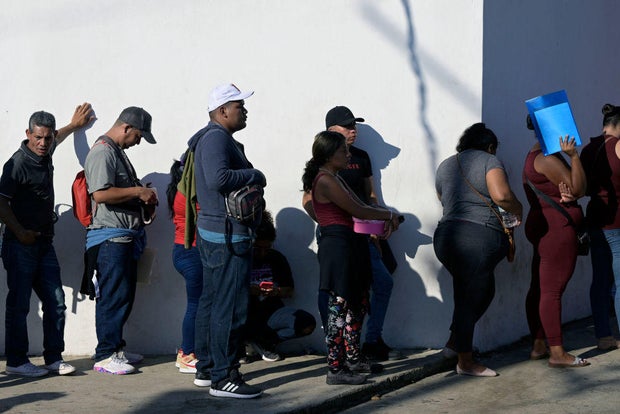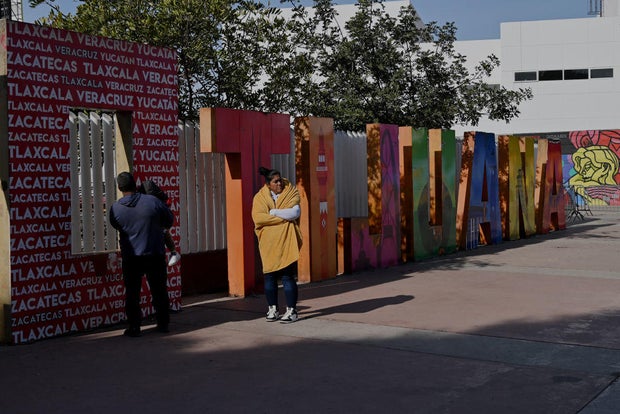Washington — The Trump administration is developing an asylum agreement with El Salvador’s government that would allow the U.S. to deport migrants to the small Central American country who are not from there, two sources familiar with the internal deliberations told CBS News.
The arrangement, known as a “Safe Third Country” agreement, would empower U.S. immigration officials to deport non-Salvadoran migrants to El Salvador, blocking them from requesting asylum in the U.S. Instead, the migrants would be deported with instructions to seek asylum in El Salvador, which would be designated a “safe third country.”
The plan, if finalized, would revive an agreement the first Trump administration brokered with El Salvador’s government, though that accord was never implemented and was eventually terminated by former President Joe Biden’s administration.
A safe third country agreement could be a significant breakthrough for the Trump administration’s aggressive immigration plans, allowing it to deport migrants from different countries, including Venezuela, that limit or outright reject U.S. deportations of their citizens.
ALFREDO ESTRELLA/AFP via Getty Images
One of the internal plans under consideration would allow the U.S. to send deportation flights to El Salvador that include suspected members of Tren de Aragua, the Venezuelan gang that President Trump has made a focal point of his crackdown on illegal immigration. Hours after his inauguration, Mr. Trump directed officials to start the process of designating Tren de Aragua a terrorist group.
If that plan is implemented, it’s unclear how El Salvador would handle the deported gang members. Under President Nayib Bukele, the Salvadoran government has subdued El Salvador’s notorious gangs, including MS-13, through a mass incarceration campaign.
Bukele’s government is expected to be a key ally of the Trump administration. Bukele enjoys broad popularity in El Salvador, and among U.S. conservatives, mainly due to his anti-gang policies, which international groups say have involved due process violations.
The White House said Mr. Trump and Bukele spoke over the phone on Thursday and discussed “working together to stop illegal immigration and crack down on transnational gangs like Tren de Aragua.”
Secretary of State Marco Rubio, who has vowed to make curbing mass migration a top priority, is also scheduled to visit El Salvador in early February as part of a trip to Latin America set to start later this week.
Representatives for the State Department, the Department of Homeland Security and the White House did not immediately respond to requests for comment.
Mr Trump has already moved swiftly to start his sweeping immigration crackdown, giving deportation officers broader authorities to arrest and deport unauthorized immigrants, shutting down access to the asylum system at the U.S.-Mexico border and enlisting the vast resources of the American military for immigration enforcement through an emergency declaration.
Carlos Moreno/NurPhoto via Getty Images
Military planes are now being used to deport migrants crossing the southern border illegally, and additional active-duty troops have been deployed there to erect barriers designed to repel unlawful crossings. Longstanding federal law generally prohibits the military from engaging in civilian law enforcement.
A safe third country agreement would add yet another layer to Mr. Trump’s efforts to seal off U.S. borders to migrants and asylum-seekers, through both physical barriers and far-reaching policy changes.
It’s unclear how such an arrangement would interact with Mr. Trump’s other moves on asylum, including giving border agents the authority to rapidly deport migrants without allowing them to request legal refuge. His administration is also reinstating a rule, known as Remain-in-Mexico, that requires asylum claimants to stay outside of the U.S. while their cases are reviewed.
Currently, the U.S. has one safe third country agreement. Under that arrangement, the U.S. and Canadian governments exchange asylum claimants crossing their shared border. The first Trump administration forged asylum deals with Guatemala, Honduras and El Salvador. Only the one with Guatemala ever took effect, and all three accords were suspended once Biden took office.
www.cbsnews.com




